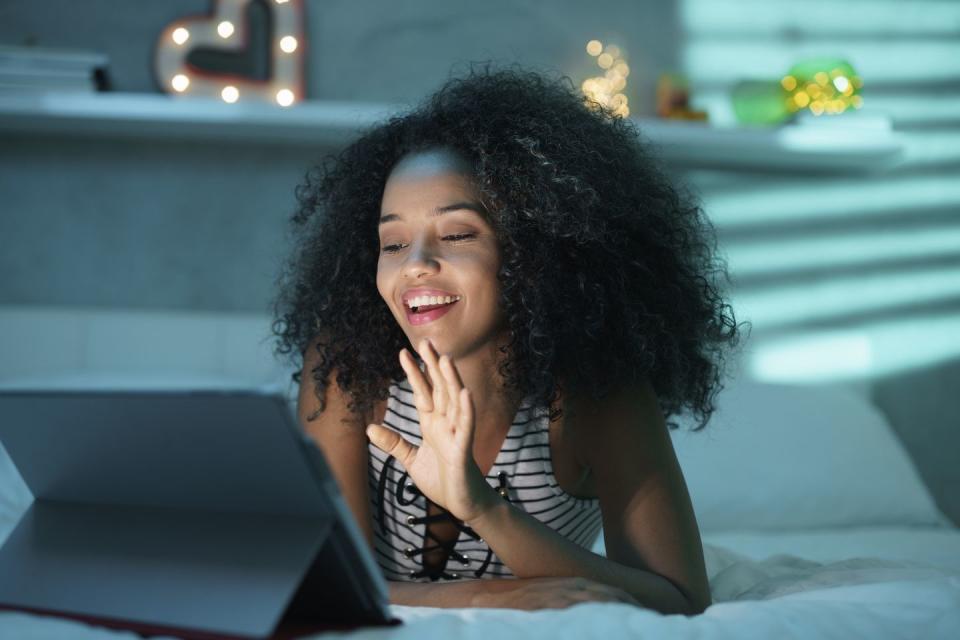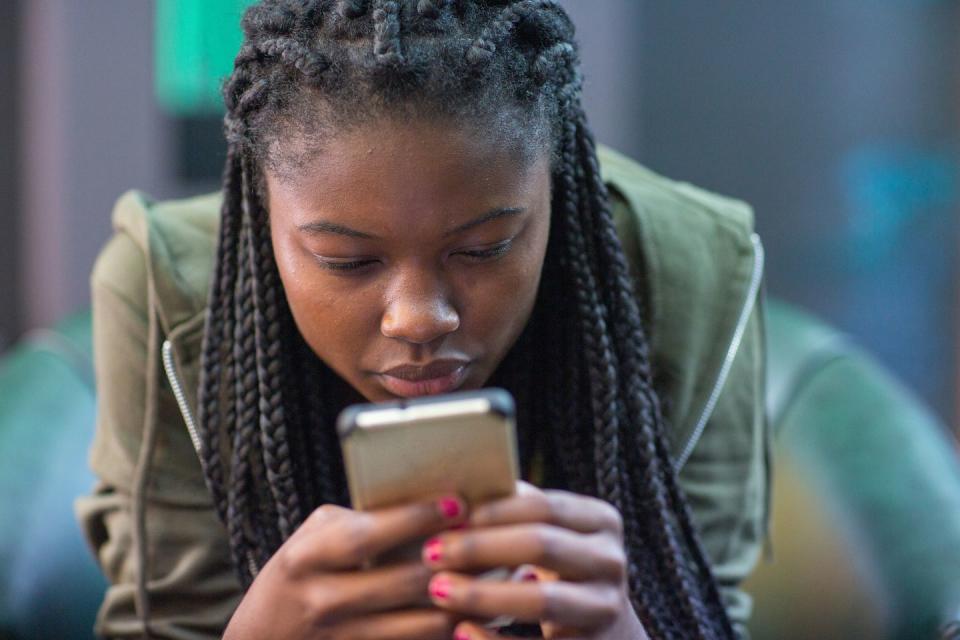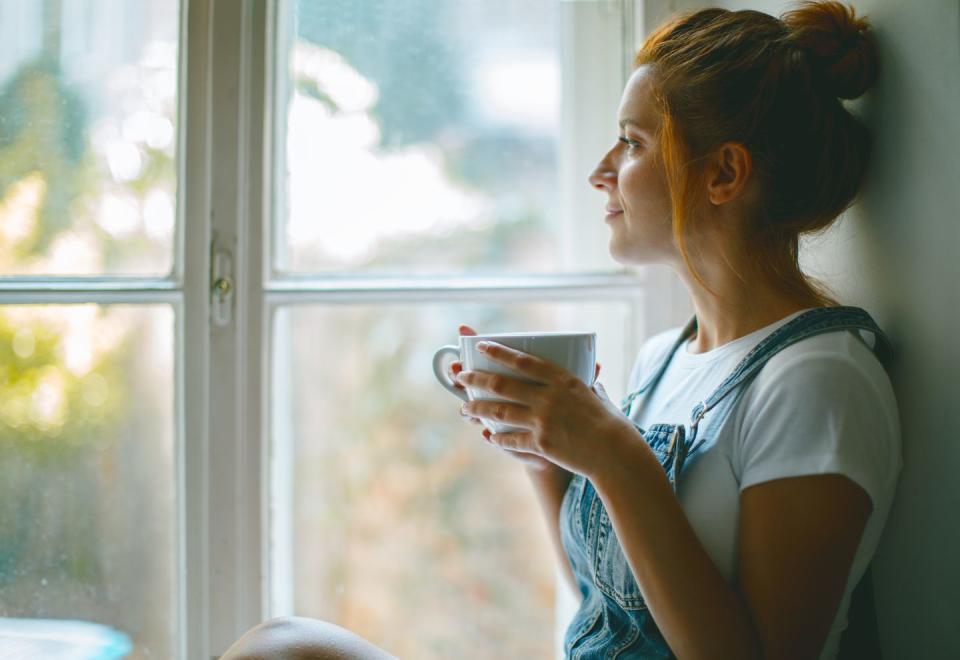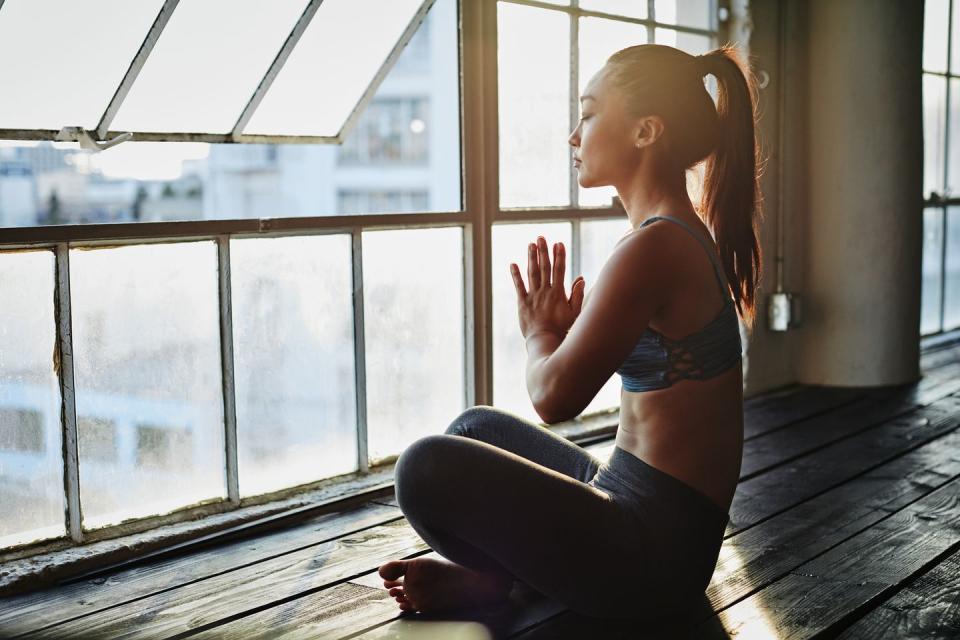5 Ways To Deal With Anxiety During The Coronavirus Pandemic

First things first. The global Coronavirus pandemic is worrying.
As we keep hearing, we are in ‘unprecedented’ times, there is a very real threat of illness – severe for some people – and the way we live our lives has been completely upended.
It is rational and normal for anyone to be concerned about this, let alone experience mental health conditions like anxiety.
So, the first rule for if you are feeling anxious at the moment, is to accept that it is fine and normal. Do not be hard on yourself; don’t beat yourself up about it.
Now, let's figure out what else we can do to help ease some of that anxiety for you. As the Prime Minister explained on Monday evening, we are likely to be on effective ‘lockdown’ battling this virus for a while, if you can do anything to reduce your anxiety now, let’s do it.
With the help of psychologist Jo Daniels, who is also a senior lecturer in clinical psychology at the University of Bath, mental health charities Mind and Anxiety UK – as well as some good first person experiences from an anxiety sufferer - here are five ways to practically deal with anxiety at the moment.
Self-isolate But Don’t actually Isolate
All too often, people with anxiety can feel they are a burden. You are not a burden and it is important to talk to people and not shut yourself off. Even if you are by yourself in your house self-isolating, do not completely eliminate social interaction.
YOU👏ARE👏NOT👏A👏BURDEN Tweet via: @nataliathrives on Twitter
A post shared by Talkspace (@talkspace) on Jan 4, 2020 at 12:00pm PST
Mind stresses the importance of making video chat plans (there are a whole lot of great apps for this) or texting and calling family and friends. If you’re worried about having stuff to run out of talking about, arrange to watch the same TV show or film at the same time as your friends, or read the same book, and schedule catch-ups to discuss them. The charity also recommends listening to chatty radio shows and podcasts and putting up more pictures of loved ones. There are also lots of peer forums about anxiety like Mind’s Elefriends.
Psychologist Jo Daniels tells ELLE that research suggests it is ‘the depth rather than the frequency of contact which is important’.

‘Talk to people who know you, people who understand and make you feel cared for. Try making new connections with people around you in your community. Talking about our feelings at this time is essential to psychological survival,’ she tells us.
Curb The News Intake
Facing a news event unlike any other in recent memory means that news platforms are in overdrive, covering just about any Coronavirus-related topic that emerges. There are so many updates from around the world and so many live blogs, that it means push notifications and articles popping up here, there and everywhere on your devices.
While it is good to be informed about what’s going on (like when Boris Johnson tell us not to go outside), you need to learn to limit the amount of news you receive. You definitely don't need to consume all of it and much of it will feel triggering.

‘Turning off newsfeed and social media notifications and checking news updates only once or twice a day is likely to have a significant impact on our emotional wellbeing given the nature of the news stories,’ explains Daniels. ‘Each time we read or hear a news item about coronavirus, we are receiving more potentially anxiety-provoking information that can make us feel uneasy or out of control.
‘Ask yourself, how is reading about coronavirus making you feel? At times, having more information increases our sense of control, however it is not necessary to have a constant stream of information. Also, make sure any incoming information is from a reliable source - some media outlets report in an unhelpfully alarming way, or report stories that give rise to feelings of panic. Seek impartial balanced news updates.’
At Home CBT Methods For Anxiety
Cognitive Behavioural Therapy is the recommended therapy programme for a wide range of anxiety disorders as well as other conditions like depression.
There are some techniques used in CBT which you can apply yourself at home too. For example, the ‘Worry Tree’ analogy:
If worries or #anxiety get too much, have a look at the #CBT worry tree for a helping hand. #itaffectsme pic.twitter.com/xU1i5CReRf
— #ItAffectsMe (@itaffectsme) June 28, 2016
Here are some others that Daniels recommends:
Worry Periods: ‘If you feel overwhelmed with worry, try to give yourself a period of 15 minutes in the middle of the day to worry. Any worrying outside of that time should be banned and revisited only during your worry period. Over time, you will find that you find it easier to defer your worries, making them more manageable. It is like any new skill, it can take time. You may even find that when you get to your worry period, that you may not need it. ‘
Thoughts Versus Facts: ‘Whenever we have negative thoughts, we tend to believe them and treat them as facts. However, if you thought you could fly, would that make it so? Unlikely. Thoughts are not facts. Weigh up the evidence for negative or anxious thoughts and challenge those that undermine or make you feel unhappy. Ask yourself, is this thought a fact? What is the evidence? What is a more balanced and realistic view? Over time, this becomes easier and with it, you will see things with more perspective.’
Accept Your Thoughts, Write Them Down: ‘Experiencing a wide variety of emotions is a normal, healthy part of existence. Accepting and expressing them is essential for a healthy mind. If you find it hard to process your feelings with other people, try journalling. Not only will it provide a keepsake of an unprecedented time, it will allow you to observe and work through feelings in a way that has been proven to be effective.’
Mind How You Respond To Anxiety: This could particularly apply to conditions like Obsessive Compulsive Disorder (OCD) where there is a compulsion to react a certain way to thoughts (obsessions), however, this just further fuels the torrid cycle of OCD. ‘One of the biggest changes we can make is in what we do and how we respond or behave, when we are anxious,’ Daniels says. ‘Googling symptoms, seeking reassurance excessively and checking in any form, are all strategies which feel like they help manage anxiety but often they increase our anxiety and trap us in an anxiety loop that is difficult to break. Instead, take a step back from these behaviours and ask yourself what you can do that helps in the longer term? Many of these strategies are helpful in moderation, mostly when they are not fuelled by fear. In a quiet and calm moment, write down what strategies you usually find helpful at times of stress, and then stick to them.'

Anxiety UK also advises using the ‘APPLE’ technique to combat anxious thoughts.
Acknowledge – Notice and acknowledge the uncertainty as it comes to mind.
Pause – Don’t react as you normally do. Don’t react at all. Just pause and breathe.
Pull back – Tell yourself this is just the worry talking, and this apparent need for certainty is not helpful and not necessary. It is only a thought or feeling. Don’t believe everything you think. Thoughts are not statements or facts.
Let go – Let go of the thought or feeling. It will pass. You don’t have to respond to the thoughts. You might imagine them floating away in a bubble or cloud.
Explore – Explore the present moment, because right now, in this moment, all is well. Notice your breathing, look around and notice what you see, what you hear, what you can touch, what you can smell. Right now. Then shift your focus of attention to something else – on what you need to do, on what you were doing before you noticed the worry, or do something else – mindfully with your full attention.
A post shared by Anxiety UK (@anxietyukofficial) on Mar 18, 2020 at 12:18pm PDT
If you have had treatment, try calmly re-visiting the strategies that you know work for you. However if they are not effective at the moment, Daniels recommends getting in touch with your GP or mental health provider.
‘You do not need to struggle alone. NHS mental health services are aware and prepared at this is a difficult time and many offer resources such as video calls or telephone calls where it is needed.’
The NHS also has a hub of how to access mental health services, where you can search for mental health support services in your local area. Many therapists – both private and NHS - are also continuing to provide CBT and therapy via virtual means amid the outbreak so look into those resources too if you are able to.
Exercise, Sleep and Eat Right
For years, I used to roll my eyes when advice like this came my way and I was in the grip of anxiety, but with age and increased wisdom I realised how important these ‘self-care’ factors really were. As Daniels, explains: ‘Regular exercise, relaxation and a good sleep routine helps with the regulation of different hormones in the body, helping to get rid of excess adrenaline from anxiety, increasing positive endorphins promoting us to think more clearly after a good night’s sleep.’
A post shared by ✨Black Mental Health Matters ✨ (@blackmentalhealthmatters_) on Jun 15, 2019 at 6:03pm PDT
When it comes to exercise, it is crucial you do it in a way you enjoy, says Daniels.
‘No exercise is sustainable if you find it dull or hard work - find music to motivate you and be creative - dancing, cleaning and gardening all get the heart pumping if you put energy into it, and exercise promotes better sleep.'

Mind stress the importance of drinking water, eating regularly and keep your blood sugar and energy levels stable, sticking to a routine while working from home and also getting as much sunlight, fresh air and nature as you can even while isolating and social distancing.
They recommend: Opening windows for fresh air, having plants in your home, arranging a comfortable space to sit by a window, spending time in your garden if you have one and even sitting by your front and back door on the doorstep.
Relaxation and Breathing Techniques
What people find relaxing differs. For some, it’s mindfulness and meditation (we have some great meditation app recommendations here), for others it might be breathing techniques, which Daniels breaks down here: ‘We know that people often breathe more quickly (hyperventilate) when they are anxious. This sometimes produces more physical sensations as part of the 'fight or flight' response, our body's way innate of increasing oxygen around our bodies so we can respond to a threat of some kind. This is great if you are faced with a pack of lions, but not as useful when it is the Coronavirus. So, one of the best things we can do is regulate our breathing which will also dampen down anxiety and the fear response.
‘Sometimes, simple is best: if you are feeling anxious, or having any other symptoms that accompany anxiety (palpitations, muscle tension, nausea) find a quiet comfortable space and take ten, slow, deep breaths. As you breathe, notice the sensation of your breath as you inhale and exhale. Become aware of the gentle purposeful movement of your chest as your lungs gradually fill and expel air, and the sensation of this expansion. As you continue to breathe, ensure that the pattern is regular and mindful. Repeat if it feels useful to do so.’

Mind also recommends having a ‘safe space’ within your home to go to if you experience panic attacks or flashbacks.
There are a number of other ways that people can find relaxation too whether its yoga, arts and crafts like painting and sewing, colouring, writing or playing an instrument. Find what works for you and don’t feel pressured to do things you don’t enjoy.
Finally, just like the adage ‘this too shall pass’ which has long been used as a mantra for people who suffer from anxiety and depression conditions, so too will this time in history.
You Might Also Like


